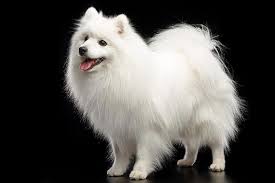
Japanese Spitz
Conditions of detention
Japanese Spitz dogs are highly adaptable and can thrive in both urban and rural environments. They are well-suited to apartment living as long as they receive regular exercise and mental stimulation. They enjoy being part of the family and need to be included in daily activities.
Useful Fact: These dogs are known for their cleanliness and relatively low-maintenance grooming needs, making them a good choice for indoor living.
Nutrition and diet
A balanced diet with high-quality dog food is essential for Japanese Spitz dogs. Their diet should include a mix of proteins, fats, and carbohydrates to support their energy levels and overall health.
Useful Fact: Due to their small size, it’s important to monitor their food intake to prevent obesity. Feeding them measured portions twice a day helps maintain their ideal weight.
Health
Japanese Spitz dogs are generally healthy and have a long lifespan, typically between 12 to 16 years. However, they can be prone to specific health issues such as patellar luxation and dental problems. Regular veterinary check-ups are important to monitor their health.
Useful Fact: Regular dental care, including brushing their teeth and providing dental chews, can help prevent dental issues common in small breeds.
Grooming and care
The Japanese Spitz has a beautiful, pure white double coat that requires regular grooming. Weekly brushing helps remove loose hair and prevents matting. They shed seasonally, and during these times, more frequent brushing is necessary.
Useful Fact: Despite their fluffy appearance, their coat is dirt-resistant and relatively easy to maintain. Bathing should be done as needed, typically every few months.
Education and training
Japanese Spitz dogs are intelligent and eager to please, making them relatively easy to train. Positive reinforcement techniques work best. Early socialization and consistent training are crucial to ensure they grow into well-mannered adults.
Useful Fact: These dogs respond well to obedience training and enjoy learning new tricks, which can help keep them mentally stimulated.
Toys and entertainment
Interactive toys and activities that stimulate their mind and body are ideal for Japanese Spitz dogs. They enjoy games that challenge their intelligence, such as fetch, puzzle toys, and agility courses.
Useful Fact: Providing a variety of toys can help keep them entertained and prevent boredom, which can lead to destructive behavior.
Safety
Ensuring a secure environment is important for Japanese Spitz dogs, especially when they are outdoors. Their curious nature can lead them to explore if not properly contained.
Useful Fact: A secure, fenced yard is essential to keep them safe and prevent them from wandering off.
Accessories
Japanese Spitz dogs benefit from lightweight collars, leashes, and harnesses designed for small dogs. Proper identification tags and microchips are also important.
Useful Fact: Soft, comfortable bedding is essential for their comfort, as they enjoy lounging and resting in cozy spaces.
Socialization
Early and consistent socialization helps Japanese Spitz dogs become well-adjusted pets. Exposing them to various people, animals, and environments from a young age is beneficial.
Useful Fact: Puppy classes and regular social outings can enhance their social skills and adaptability, making them more comfortable in different settings.
Travel and Transportation
Japanese Spitz dogs travel well if accustomed to it from a young age. They should be secured in a crate or with a seatbelt harness during travel.
Useful Fact: Their small size makes them easy to transport, and they often enjoy being close to their owners during trips.
Behavior and psychology
Japanese Spitz dogs are known for their cheerful, playful, and affectionate nature. They form strong bonds with their families and are generally good with children and other pets. They can be wary of strangers but are usually not aggressive.
Useful Fact: Providing regular mental and physical stimulation helps maintain their positive behavior and overall well-being. Their playful and loving nature makes them excellent companions.
Legal aspects
There are no specific legal aspects concerning Japanese Spitz dogs, but local regulations regarding pet ownership should be followed. Ensuring they are registered and microchipped is important.
Useful Fact: Being aware of local leash laws and breed-specific legislation is important for responsible ownership. Registration and identification help in case they get lost.


